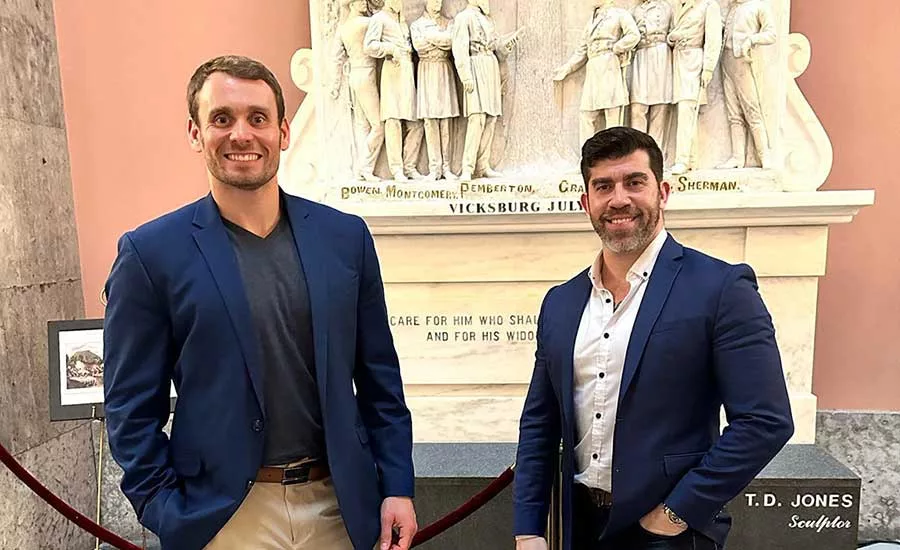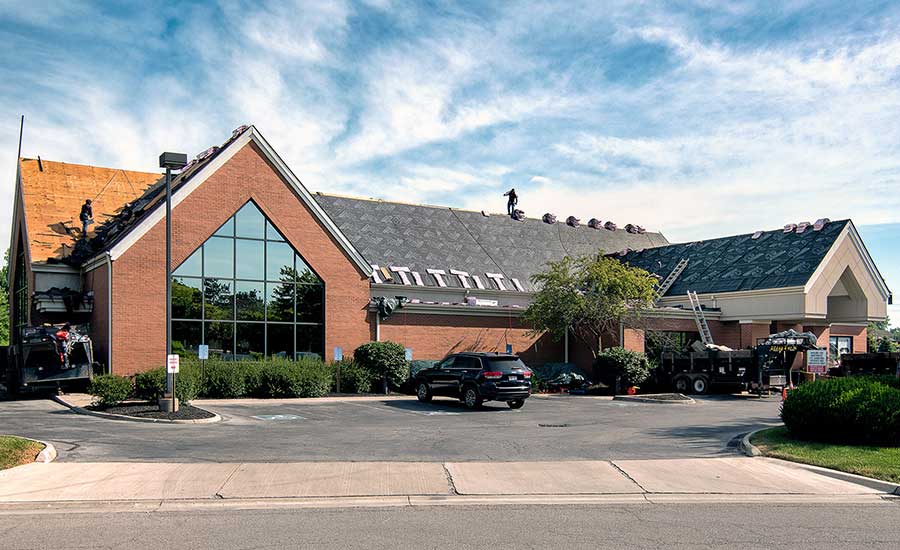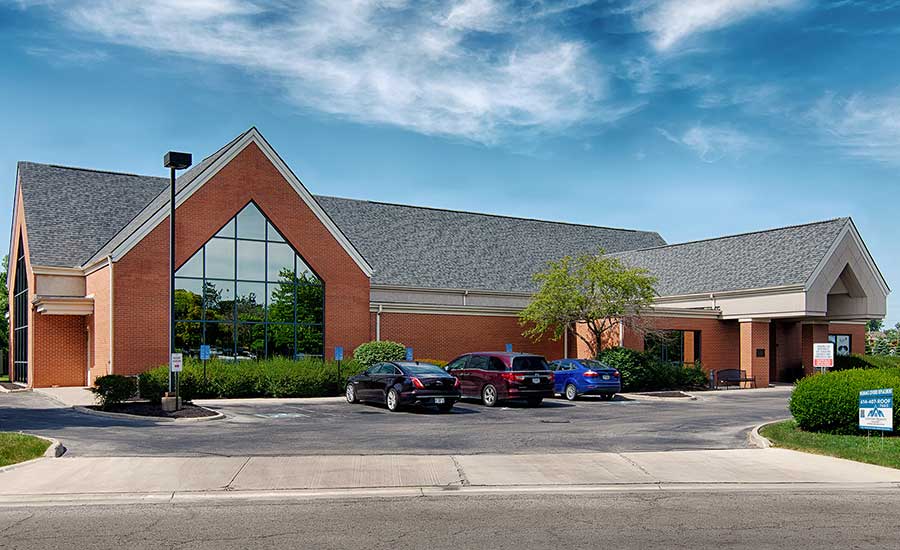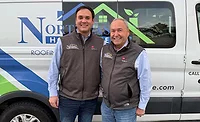Sponsored by Beacon
Contractor Profile: Lifetime Quality Roofing
A chance encounter working together at a fitness center turned these 'gym rats' into a roofing juggernaut

More often than not, roofing contractors — especially the successful ones — have some preexisting connection with the industry. It’s usually the case with most skilled trades. Particularly when a contractor is flourishing, heritage is a kind of “soft skill” that can be leveraged as an asset.
Of course, that’s just anecdotal, or “broscience,” since the collective roofing lineage of Lifetime Quality Roofing’s principals, Alex Gerhart and Zach Willard, is the experience Gerhart had as a teen hauling bundles onto steep-sloped roofs and slinging shingles. No matter since, as these two fitness enthusiasts have demonstrated, their success in the roofing space required little foreknowledge of an open valley or an overhang. That can all be learned.
But the art of operating a company — how to speak with customers, standing good for your product, and treating employees as people versus assets — existed within the co-CEOs well before their firm’s founding in 2015. It’s also been the “bulk” (or fuel, for those uninitiated with gym slang) for their achievements.


While commercial roofing is still a relatively small part of Lifetime Quality’s overall portfolio, Gerhart says it continues to grow. The company’s commercial projects are run out of its Dallas office.
Photo courtesy of Lifetime Quality Roofing
Selling Ice to Eskimos
Lifetime Quality Roofing’s name could be a paean of how the two 30-somethings met: at work, at a fitness club. In their case, it was an L.A. Fitness versus Lifetime Fitness, but it’s thematic nonetheless.
Gerhart, 36, has been a salesman for years, first cutting his teeth selling life insurance. The pivot to roofing was precipitated by a seeming one-and-done encounter with a policyholder who requested a meeting for help. As he described it, Gerhart — then in his mid-20s — showed up to the meeting as the gentleman he met arrived in style, clearly making an impression.
“So we showed up to the meeting,” he describes, noting the man’s accouterments: “Louis Vuitton gym bag, Rolex, driving a brand new Mercedes; and I asked, ‘What do you do?’”
“’I actually sell roofs,’” Gerhart recalls him saying.
“Yeah, I’m doing that now, too,” Gerhart replied, laughing.
The next day, he started working for the man’s company.
“So I started selling roofs for him [and] I outsold his entire sales team for the season … within 90 days,” Gerhart said.
Quickly promoted to sales director, business was light that winter and Gerhart spent enough time at the gym that managers solicited him to help sell memberships.
“I got bored, and [L.A. Fitness] pushed hard, and I said, ‘You know what, I’ll just come in and do it,’” he explained. “They were opening a new gym; there was a lot of opportunity to make money; I’m a sales guy, I was bored, I have the time, and I’m just going to do it.”
That’s where Gerhart and Willard, then a top national salesman for L.A. Fitness, met. The two men opened a new branch together, and, as Gerhart described it, the two were “crushing it.” Their salesmanship was, by all accounts, stellar.
Despite the success — L.A. Fitness had dangled a general manager position to him as a carrot — Gerhart knew there was no comparison between selling gym memberships and roofing. It’s like comparing the farm system to the majors.
Meanwhile, Willard, who had been with L.A. Fitness for a few years, was gobsmacked that his pal would walk away from what, in his perspective, was a golden opportunity. Willard asked his friend if he knew something, presumably about the state of affairs at L.A. Fitness, that would make Gerhart decline a potentially lucrative career with the company.
“I said, ‘You know that 45 minutes you spend with a customer selling a gym membership and make $75 bucks? Well, in roofing, you can sell and make $1,000, $2,000 or more,” Gerhart said. “It’s not much different than what we’re doing now, but the commissions are much bigger.”
Willard submitted his two-week notice to L.A. Fitness, and a few weeks after that, they were selling roofs. However, now in management, Gerhart said he began noticing things about how the company's principal comported himself that he hadn’t seen in those initial halcyon days.
Despite misgivings, the two stuck it out until several insurance adjusters, independent of the other, made comments about the roofing company that were unsettling at best.
“We had built a lot of rapport with the adjusters, really good relationships, and eventually those guys started showing up to the [inspections] saying, ‘I wish you weren’t in that [company logo] shirt’; ‘That’s not a good company’; ‘You guys need to get out of there,’” Gerhart recalled.
Then there were pay issues. A cardinal rule of sales: never mess with a salesman's commission. Each shared their misgivings with the other and decided to leave the company and strike out on his own. Yet, they were a formidable team, and with the notion of safety in numbers, they set out together to form Lifetime Quality Roofing.

Willard and Gerhart (at left) work hard, so it stands to reason they play hard, too. This photo, taken during a company retreat in 2023, featured guest speakers, including Phil Heath (center), an International Federation of BodyBuilding and Fitness, or IFBB, professional bodybuilder and seven-time Mr. Olympia winner.
Photo courtesy of Lifetime Quality Roofing
Growth by AMRAP (As Many Repetitions as Possible)
Lifetime is not the first freshly minted concern to become successful through the lessons learned from a mentor’s mistakes.
“A lot of guys in the industry — contracting — they’re so focused on making money that they sometimes leave money on the table,” Gerhart says. “They trip over $100 bills to get their pennies by not taking care of the customer properly, not providing the highest quality of work.”
Roofing can, unfortunately, be rife with malfeasance, like other skilled trades, which makes the hard-won gain of a good reputation so crucial to safeguard. Taking the eye off the ball can quickly cause a firm to go sideways, and Lifetime places tremendous emphasis on the customer experience.

Headquarters: Columbus, Ohio
Specialty: Steep-slope Asphalt, Low-slope TPO, Solar
Number of Employees: 225 full-time; non-union
2022 Revenue: $65 million
Website: lifetimequalityroofing.com
Willard said that approximately 40% of the company’s new business comes by way of referral, which is slightly higher than the national average of 36%, according to statistics by JobNimbus, a roofing technology solutions firm.
Sitting in a closet inside the company’s newest office in Tampa, Fla. — because it was the only non-occupied room in the suite — Willard recalled his first foray into roofing with that company whose name shall not be uttered, describing something akin to an emersion course in “worst” practices. Those lessons would become formative for the pair when they founded Lifetime.
“We’re businessmen, we’re not sales, we’re not roofers, so we knew we could take that business model in this amazing industry and just make it our own,” said Willard, now 34.
Like Gerhart, Willard’s personality is professional but still gregarious, open and earnest without seeming glib. It’s easy to see how these two work well as a team. It’s noteworthy that, throughout a 90-minute conversation, neither man interrupted the other while answering questions, not once. They are also both excellent listeners, a highly coveted trait among customers.
The company is predominantly residential, at 85%, and it’s all reroofing and insurance work. Gerhart said the company’s commercial operations are handled out of its Dallas office, and the percentage is growing. Currently, the company is working on a large commercial project for a school district in Florida; Tampa is the firm’s eighth and newest location.
Based in Columbus, Ohio, the firm has three Ohio-based regional offices in Cleveland, Cincinnati and Youngstown in addition to its Florida location. Lifetime also has a second Texas office in Austin and an outpost in Pittsburgh.
Besides an above-average customer referral rate, the company’s insurance work is a significant part of its revenue, which is why those relationships with adjusters make such a difference. And after Tallahassee lawmakers made substantive changes to Florida’s homeowner insurance statutes, Lifetime believes that its share of business may increase in the Sunshine State.
“Any shift in the market, any change, you’re going to view it one of two ways: you’re going to view [them as] huge issues, or you're going to see huge opportunity,” Gerhart explained, adding, “We're very opportunistic.”
Even a glass-half-full mentality can’t obscure the challenges contractors in Florida face, particularly as hurricane season gets underway and, as both men believe, a mass exodus of roofing contractors from the Sunshine State is underway.
“When we saw they changed the insurance laws, it was a jaw-dropper at first,” Gerhart said. “I couldn't believe that they would change the laws so in favor of the insurance companies. They would basically screw over Florida homeowners and property owners.”
And, yet, the glass can remain half-full.
“If you look at the other side, we had a mass exodus, tons of insurance-related companies that moved out of the state,” he explains. “So, demand remains constant, but now supply — of how many people can actually do a roof repair or reroof — has diminished.”
Willard said, anecdotally, that since the state passed its electronic verification law to combat illegal immigration, 30%-40% of roofing crews have left Florida. Definitive statistics are hard to come by, but there’s little doubt the state’s insurance reforms have had a major impact.
Neither Gerhart nor Willard are ones to sit and wait, and they understand opportunities are often created rather than stumbled upon. They took on the pending legislation in Florida, and similar efforts in Ohio, with lawsuits claiming the bills restricted a roofer's ability to solicit after storm damage.
They won their case in Florida, which earned the firm Owens Corning’s MVP Award.
“They argued that this bill violated their First Amendment right to free speech because the bill limited their ability to encourage homeowners to file roof damage claims,” Owens Corning officials said upon delivering the award. “It limited their ability to canvas, [using] the word ‘claim,’ and also would eliminate use of replacement cost value (RCV) with actual cost value (ACV), thus paying a significantly lower amount based on depreciation to homeowners that now needed a roof replacement.”
Process Makes Perfect
Gerhart and Willard have not refashioned how a roofing concern operates, but instead, the businessmen have taken their experience growing businesses and implemented best practices — processes — and calibrated their company accordingly.
“Alex and I are so process driven, and making sure that we're setting up an efficient, streamlined process internally — in every department,” Willard said. “You don't see very often in the industry.”
The company’s 225 full-time employees are all on the operations side, like administrative staff, sales, quality control and traffic. The roofing crews are subcontracted.
“We have a great process for selecting contractors, and we like to build a relationship with one subcontractor and help them grow alongside our company,” Gerhart added. “We control every part of the process … we do all of our own scheduling, all of our material orders, and have [employees] who specialize in every facet, [including] pulling permits.”
Trusted subs are a contractor’s clutch resource, which still means depending on someone your company does not “employ.” To mitigate risk, Lifetime deploys site managers to each jobsite. Interestingly, Gerhart describes an almost breath-holding notion of waiting for the “when,” not “if” something goes awry, which seems to keep the men on their A-game, like the Sword of Damocles hanging over their heads.
“Something is going to happen,” he says. “We're all in construction and want to be the first one to bring [issues] to the customer’s [attention].”
The processes, they say, are designed to ensure dedicated specialists are nestled in a specific area of the company’s operations and don’t cross over into another’s lane. That, they explained, is when things can go south.
“We want to control as much as we possibly can because, at the end of the day, it's our reputation on the line,” Gerhart says, punctuating it by adding, “And I'm not going to let anybody sully our reputation; …we go above and beyond to make sure we control as many facets of that process as humanly possible from beginning to end.”
When it comes to convention, Lifetime eschews it. Willard and Gerhart were not born into the industry, so dogma about how things “should be” never dictates how they operate. They complement each other even though they are more similar than different. In the end, each has a work ethic that is demonstrated by the company’s year-over-year performance. Revenues for 2022 were booked at nearly $65 million, $22 million of which is slowly making its way to remittance because that’s just how insurance companies roll.
They are “sky’s the limit”-type guys poised for continued growth because AMRAP is not just a mantra for gym rats. They seek opportunity and create it when it’s not apparent. Asked what advice they could offer those reading about them and wanting to emulate their success, Willard offered this:
“While sales are critical to a well-functioning business, so is process; … build out your internal process to be efficient and scalable from the beginning,” he says. “Don’t get caught up in the roofing industry norms and look outside the industry for guidance on setting up your systems; take care of your people, and they will treat your company as their own!”
Looking for a reprint of this article?
From high-res PDFs to custom plaques, order your copy today!







